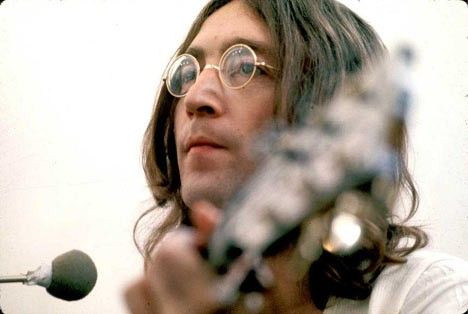John Lennon “Died” Long Before His Official Passing
OPINION

The anniversary of the murder of John Lennon has to be one of the saddest and most depressing occasions for any Beatles’ fan, or for anyone who follows music and modern pop culture.
The details of the killing on Dec. 8, 1980 are sadly familiar to almost everyone who remembers that awful event -- a delusionary madman named Mark David Chapman shot and killed Lennon outside his Dakota apartment on the Upper West Side of Manhattan, just a few months after the ex-Beatles’ 40th birthday and after the release of his first album in five years, ‘Double Fantasy.’
However, for this particular Beatles’ fan, John’s sudden and untimely death made me melancholy for other reasons.
Even though I was (and am) a Beatles fanatic, the news of Lennon’s murder -- while shocking and distressing -- really wasn’t that big of a deal to me. While that may sound cruel and contradictory, let me explain that, in my mind, John Lennon – as a musician, songwriter and global icon -- ceased to exist long before his corporeal body exited this earth.
I believe the last ten or so years of John’s life was largely a wasteland where he accomplished very little and simply atrophied creatively, rendering him a virtual recluse and irrelevant.
Some have celebrated John’s years in New York as something of a “renaissance” whereby he was freed from the constant hounding by the press in Britain and the demands of being a Beatle and able to live freely in the greatest city on earth with the love of his life, Yoko Ono.
I say nothing could be further from the truth.
Lennon’s last truly great musical statement was the album “Imagine,” which was recorded entirely in England in the summer of 1971, just prior to his departure for the U.S.
Following the release of “Imagine,” Lennon (by then, having permanently settled in New York), produced a series of albums that ranged from mediocre (“Walls and Bridges”) to downright horrendous (“Sometime in New York City”).
He had essentially lost his talent and his muse. Lennon “retired” from the music industry in 1975, allegedly to become a “house-husband.”
When the “Double Fantasy” album -- an unexciting, but mildly pleasant record – was released five years later, I recall there was some initial interest in it by the media, solely because of the identity of the recording artist. But the underlying music was far from innovative or noteworthy.
At the time of John’s death, New York City was a million miles from me and I never could have foreseen that I would eventually move here myself and spend virtually all of my adult life there. Although I love New York (as John apparently also did), I can’t help but think that he should’ve never relocated here.
I’m not saying that New York City ‘destroyed’ John Lennon – but clearly living in America did little for his creative spirit and musical ability.
Granted, the quality of music produced by his old band-mates Paul McCartney and George Harrison during the 1970s ranged wildly from superb to atrocious – however, John’s decline was even more precipitous.
Moreover, what the Beatles accomplished in the 1960s was an impossible act to follow -– making any comparison to their later activities patently unfair. Still, John Lennon went from being the number one pop culture figure on earth to something more pathetic and mediocre in a bewilderingly short period of time.
One must also remember that when John arrived permanently in New York he had never had anything remotely close to a normal life. He had just completed about a decade of living the surreal life of something called a “millionaire pop star” and before that, he endured a largely unhappy childhood in the dreary grey town of Liverpool without a mother or father to guide him.
And he was only 31 years old.
But he was, for all intents and purposes, finished as a creative person. Perhaps he was looking for ’normalcy’ – and perhaps he did find it, by temporarily withdrawing from superstardom, giving up drugs, settling down and having a child (Sean) that he truly loved.
But was it worth it?
I’m not sure.
John Lennon’s entire legacy – that is what he will forever be remembered for – lies basically with what he created from 1962 (The Beatles’ first single) through 1971 (release of Imagine).
Everything thereafter was devoid of the innovation, creativity, wit, charm and extraordinary talent that he evinced during his unbelievably fertile younger years.
There is also some mystery as to why John moved to the States in the first place. One theory posits that he had to move to American to help Yoko Ono find her daughter from her first marriage. Another version claimed that they were so bothered and tormented by British tabloid media (and the relentless haranguing of crazed fans) that they were “forced out” of Britain.
But why move to New York? I mean, who goes to the teeming, crowded streets of Manhattan to “get away from it all?” and “hide from the outside world?”
John being in America made no sense to me. What was he really running away from? I think he continued to deteriorate in New York. Despite his vast wealth and fame, he reportedly led a very spartan and isolated existence in the city, whole his wife handled his millions and business affairs.
Moreover, photos of John during the last years of his life depict an almost-cadaverous, hollow-eyed wastrel -- hardly the picture of someone who was “rejuvenated” by living in America.
This is why I say that he “died” long before his actual death. And that’s why Dec. 8, 1980 means little to me.
© Copyright IBTimes 2024. All rights reserved.





















